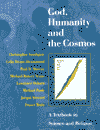How to Think About Providential AgencyIs it possible to speak of God acting providentially in the life of a particular person or community? In an account based on the Christian tradition this means also considering the question of miracle and what is for Christians the most central of actions, the resurrection of Jesus.
However, it is important to stress that science
can as yet give no clear account of what these two sorts of intentionality in
humans involve. So human agency is a very imprecise basis for analogies to God’s action. Nevertheless it remains
the best basis we have. There is a whole range of different
theories as to how God might be able to act in a world which can also be
understood in turns of law and chance, interacting according to the principles
of science. The best recent classification of theories of divine action is by
Thomas Tracy.
Email
link | Feedback | Contributed by: Dr.
Christopher Southgate |




